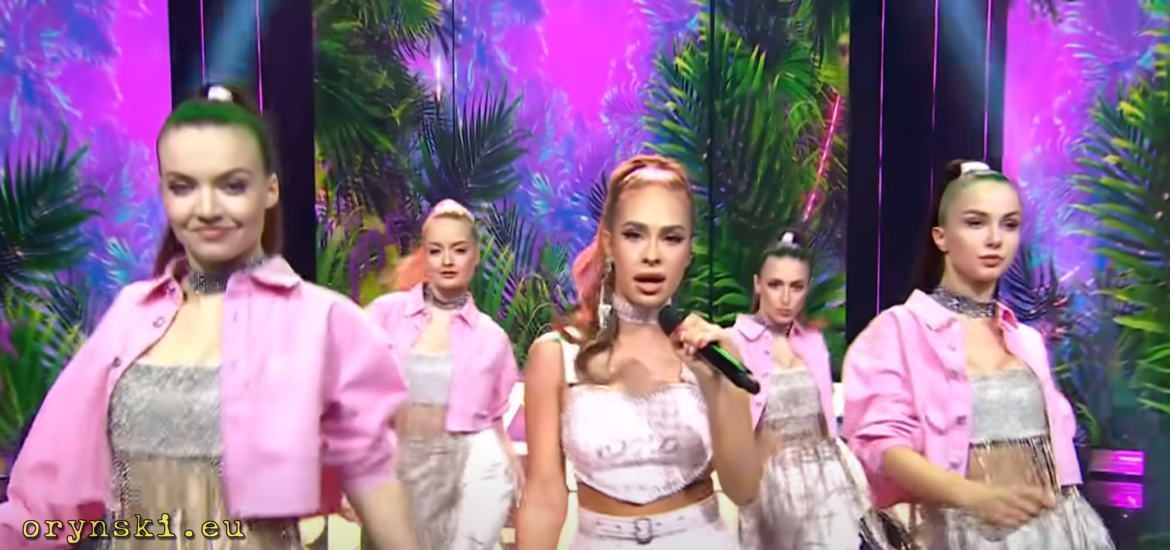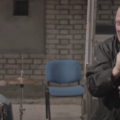As I am collecting news items to feature in the new chapter of Absurdistan, I found an interesting drama regarding this year’s entry Eurovision song content. And I thought that maybe this week, instead of usual digest of the recent news, we can focus on that one thing, as in the lense of Eurovision – and, more generally, culture in public TV – we can not only see exactly what PiS is doing to Poland but also a wider changes over a longer period of time.
Click HERE to read the previous part of the series
Click HERE to see all chapters of the series so far.
Poland entered the Eurovision contest with a bang: in 1994 Edyta Górniak’s song “To nie ja” was awarded second place, and many people believe it was only because the Eurovision organizers didn’t trust the newcomer, post-communist country to organize the finale next year.
With such an overwhelming success right at the beginning (both Polish participation in Eurovision and Górniak’s career) it was hard to match it, even though in the following years Poland was sending pretty decent artists like Kasia Kowalska or Mietek Szcześniak. But as Eurovision became a synonym of kitch and cheap music, some of them – notably jazz singer Anna Maria Jopek – were mocked for taking part, and so as the years progressed, TVP struggled to find someone willing to represent Poland in this context. Poland decided to give up and in 2003 they sent the band Ich Troje, that at the time was extremely popular in Poland but also a symbol of bad taste, which seemed to be a good decission, as they ended up in the 7th place overall, and only in 2017 by Kasia Moś ended with higher score.
After Ich Troje success the struggle became real, and TVP really scrapped the barrel, sending a series of artists that nobody ever heard before or after (with the exception of Ivan Komarenko who came back into public spoiler when he recorded anti-lockdown COVID conspiracy song and now is a supporter of Putin).
2014 was remembered for a song by Donatan and Cleo, which, although not musically interesting, was mostly remembered for a video clip in which a breasty model in traditional clothes was making butter in a very suggestive way, so suggestive that, as the rumour goes, the live performance had to be adjusted as it was deemed too sexual. But when the fate of Eurovision being a festival of cringe and bad taste seemed to be sealed, something turned around, and decent artists like Monika Kuszyńska, Michał Szpak or aforementioned Kasia Moś agreed to go and represent Poland again.
But at around this time the Polish state broadcaster, TVP, was taken over by PiS. Faithful readers of this series know very well that it resulted in a great purge of politically inconvenient journalists, which, in turn, prompted many stars, even those not active politically before, to boycott TVP in a protest. As Jacek Kurski, then chief of TVP doubled down, it led to the destruction of even the most prestige events like the Festival of Polish Song in Opole (see chapter 27 of this series). As the biggest stars and good journalists left the station, the viewership of the public media started to fall dramatically, and so Jacek Kurski decided to try to bring back the viewers by catering to popular tastes. It was at about this time that terrible kind of cheap dance music known as Disco Polo – a genre compared to which Holky z naši školky by Kotvald a Hložek sound like Queen compared to Sex Pistols – became a staple food of the cultural diet served by the national broadcaster.
Jacek Kurski’s favourite artist Zenek Martyniuk along with Boys and Disco Polo veterans Bayer Full suddenly became the most important artist in Poland. Martyniuk even had a hagiographical feature movie produced by TVP. As I write those words, my friends from Wrocław are fuming with outrage after Bayer Full performed their biggest hit “Majteczki w kropeczki [Polka dot panties]” in Wrocław’s Opera house during some event organized by PiS in attendance of, amongst other, minister of education Przemysław Czarnek…
This shift in the cultural offer of TVP is considered by many yet another fields where PiS ignores the law. Because TVP, as a public broadcaster, has a mission that – apart from providing impartial information – obliges it to promote quality culture. And while it is not the first time TVP has been turned into a propaganda machine, even during Martial Law in the 1980s the field of music and culture wasn’t as barren as it is today.
We have to remember that TVP is one of the most important cultural institutions. Right from the beginning of television broadcasting in Poland, it was providing quality content. Some shows, like Kabaret Starszych Panów became classics, and their songs, performed by the best singer and actors then, are covered, interpreted, or remixed till today
With the emergence of rock and modern pop music in the 1960s, one could not imagine how the careers of artists such as Czesław Niemen or Maryla Rodowicz could gain such momentum. TVP was also promoting foreign music – with a preference for the music from Eastern Bloc countries like the Soviet Union, Hungary, or Czechoslovakia (readers who are familiar with the Polish language might chuckle on realization why it’s not Karel Gott or Helena Vondráčková, but Eva Pilarova’s Czech cover of Janis Joplin that became one of the most fondly remembered Czech songs from that era (the clue is in the chorus). But there were also some unprecedented events like when in 1976 Abba, back then already one of the biggest stars in the world, came to Warsaw to play a full show on TVP.
It is thanks to the public broadcaster that we have enormous archives of footage of the artists that are no longer with us like Zbigniew Wodecki or Andrzej Zaucha (let me share a bit of personal opinion here: this is, in my opinion, one of the best Polish pop songs of all time). It is also the TVP archives that are responsible for the first Polish video clips. Even if initially they were a bit silly (like when Skaldowie were just put into postman’s uniforms for their song about a postman and sprinkled with some random smiling girls), soon they became pretty professional and had nothing to be ashamed when compared even with Western productions (like this version of Niemen’s Mourner’s Rhapsody).
Of course, as in the communist country, politics had to put its hand on some things, and so one of the biggest Polish hits ever by the first Polish blues band Breakout will be forever remembered with its video clip where the band pretends to do “village things” in an open-air museum, as the folk theme was forced on them to counterbalance the fact that the music they play has a source in imperial America:
The state broadcaster not only cooperated with big bands, like Orkiestra Wojciecha Trzcińskiego, but had several own ones on the payroll, scattered around Poland in the local television centres. Their jobs was not only to accompany artists and record film/tv program scores, but provide live entertainment. And, as in planned economy, they were required to provide certain output, so if they had nothing to do, they were recording their own music which brought us so many gems like the funkiest orchestra in Eastern Europe – which happened to be a Polish Radio and TV band from Łódź under direction of Henryk Debich (although Alex Band was a strong contender to that title too).
With the rock boom of 1980’s, Public broadcaster was also playing a crucial role. Performances in Opole festival of bands such as Maanam, Lombard or Kombi were watched by tens of millions, and newly established 3rd program of Polish Radio (commonly known as “Trójka”) gained a cult following for keeping hand on pulse of what’s going on in popular music (including in the West).
This continued well into the nineties. Shows like Clipol were to my generation what MTV was to our Western peers, but there were also programs promoting also more sophiscitated music like Muzyczna Jedynka or Kraina Łagodności. This short history draft can’t ommit the legendary youth program Luz, that apart from other content created a vast archive of videoclips to the biggest hits of the era, shot at virtually no budget with the original intention to just broadcast them once during the show. Nobody expected them to become classics, like this video to Dżem’s “List do M”. Another notable mention would be a surrealistic show Lalamido which also promoted young artists, often playing alternative music.
But in the 1990’s the influence of the church started to be visible – also in TVP. The controversial Lalamido had been moved late into the night, then cancelled altogether. Luz had to give it’s afternoon spot to another, less popular show that in turn soon gave way to another youth program, but this time prepared by the Catholic division of the TVP: “Raj”, which all my friends agreed at the time was virtually unwatchable.
Luckily at this time younger generation had unprecedented access to culture via commercial media, satellite TV and, later, the Internet, so the role of public broadcaster as culture creator diminished, but it was only after the aforementioned PiS takeover that they seemingly abandoned it altogether, focusing on catering to the lowest tastes in pursuit of viewership instead.
And here we are back at Eurovision. In 2021 TVP sent a C-grade star to thank him for agreeing to take over a popular music show “Jaka to melodia” after its long running host left quoting vision differences (allegedly he was not willing to include Disco Polo in his program). And this year they decided to pretend our representative is elected by popular vote, and here we arrive at that Eurovision drama that prompted me to write this article, as several of my readers sent it to me saying “this will be perfect for your next Absurdistan”.
First, the jurors were shocked after someone translated one of the songs from English to them and they learned out what “booty” means. There was some talk about removing the song from pre-selection contest, but finally it was allowed to participate. The best song of the pre-selection – both in my personal opinion, and according to the popular vote – was the song Gladiator by an emerging singer Jann:
But the jury decided otherwise, which sparkled the outrage of both Jann and Eurovision fans. Ladies and gentlemen, I present to you the Polish entry to 2023 Eurovision: Blanka and her song “Solo”:
If someone played this song to me a week ago and told me this is his drunk friend singing some old Ace of Base song during some late night karaoke in the pub, I would have no problems believing that. Since the members of the jury have ears too, it is clear that their decision has not been based on merit.
There are rumors circulating: that Janne’s submission was shot down because the singer’s image is too androgynous, which would not fare well for the country leading the fight against LGBT invasion and gender ideology. Or that Blanka has been chosen – and promoted by TVP before (she was one of the stars of this year’s New Year show) – because of some connections of her parents, or because she is a friend of one of the juror’s son. Of course, I have no means to check if any of it is true, but this is not the point.
The point is that if any of it is true, then nobody would be surprised, shocked, or outraged. Because promoting mediocrity, cronyism, and shooting down talented people became the new normal in PiS Poland.
There is a famous quote from Stanisław Kisielewski: “Że jesteśmy w dupie to jasne. Problem w tym, że zaczynamy się w niej urządzać” (it’s clear we are in the ass. The problem is, we’re starting making ourselves comfortable). I hope the sound of Blanka’s squawking won’t let us feel TOO comfortable.
This piece was written for Britské Listy
Picture: Screen from Blanka’s Eurovision clip.





